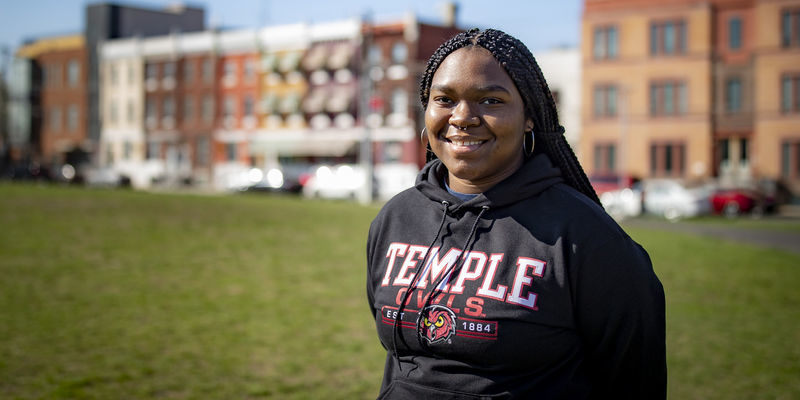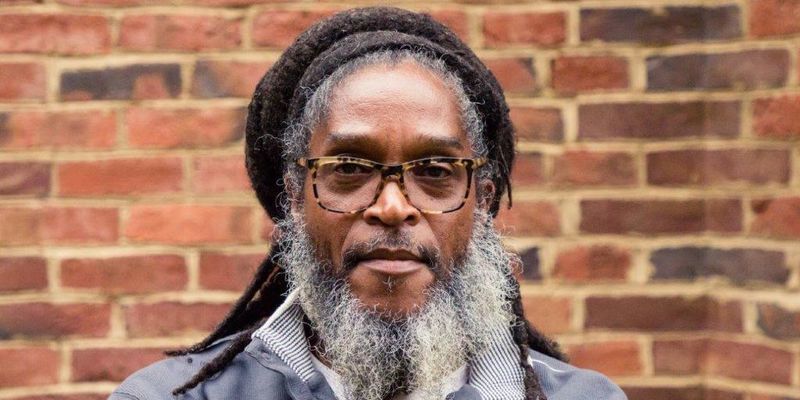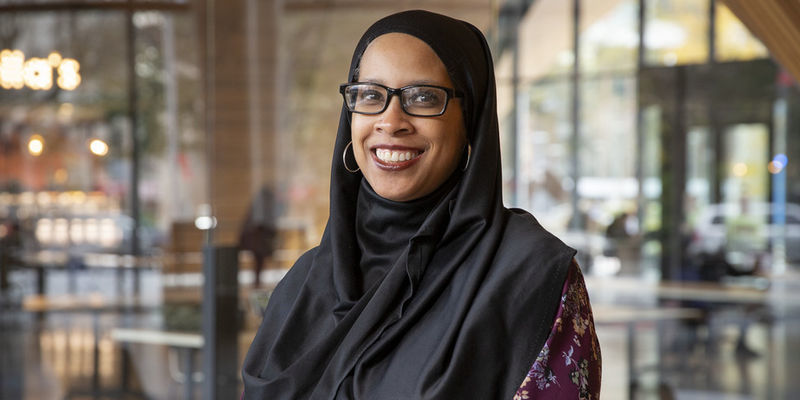Temple course answers the question: Why care about college?
Jennifer Johnson, an assistant professor in Temple University’s College of Education and Human Development, teaches students how to get the most out of their college experience and jumpstart their careers.
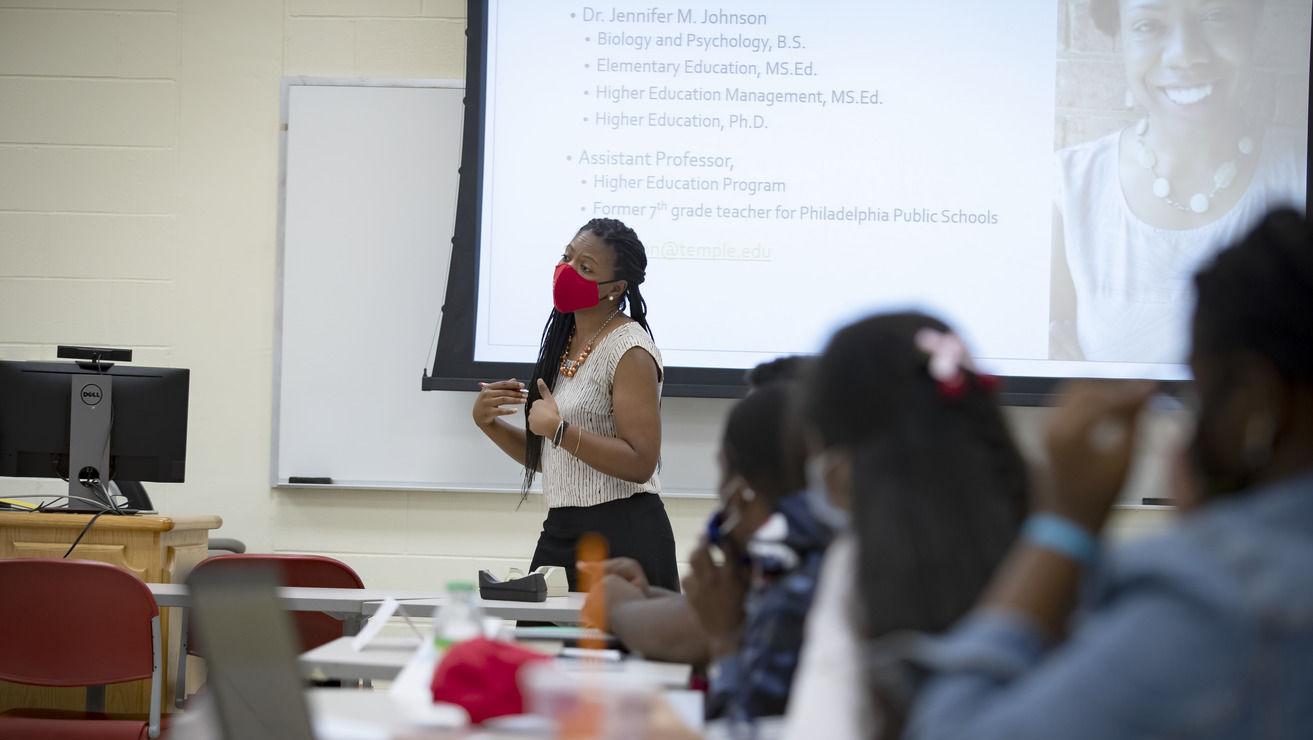
In early August, a cohort of 17 high school students from district and charter schools in Philadelphia piled into Ritter Hall for the first day of Why Care about College: Higher Education in American Life, a college credit course offered at Temple University. The class is intended to prepare students for the world of college.
It is offered for both Temple students and high school students who are enrolled in Temple Education Scholars, a yearlong dual enrollment program that enables college-bound high school seniors to take a full semester’s worth of courses at Temple.
Leading the course is Jennifer Johnson, who has been teaching in Temple’s College of Education and Human Development since 2017. Johnson draws on her personal experience to shed light on her research, which focuses on college access and success and works to equip students with the tools and resources they need to be successful in their majors.
“When this course was being developed, it involved thinking about innovative ways of creating general education courses that really reflected what was going on in the world,” said Johnson. “It’s an opportunity to take something that is interesting to students in terms of how to make the most out of college, but broadens their perspective on it.”
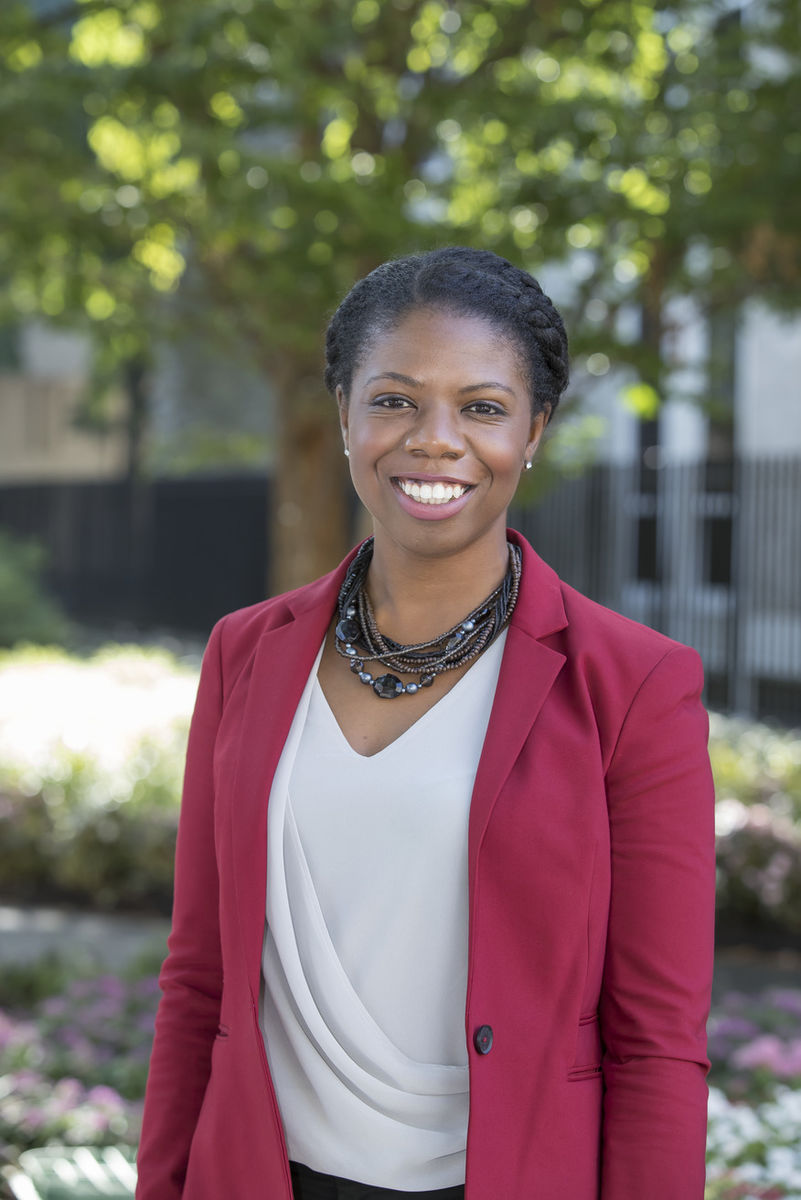
A former Philadelphia middle school teacher with a background in science and mathematics, Johnson spent several years working as a counselor and advisor for college access and success programs. (Photo by Betsy Manning)
Growing up in Buffalo, New York, Johnson noticed the educational and economic disparities in schools and colleges, so she was motivated to conduct research that focuses on the experiences of minorities who are underrepresented in colleges and to empower more women and people of color into STEM (science, technology, engineering, and math) disciplines. She has authored 13 publications.
“I recognize the importance of college as a gateway to opportunity, especially for those from marginalized communities, and I research the experiences of folks that are historically underrepresented in college spaces,” said Johnson.
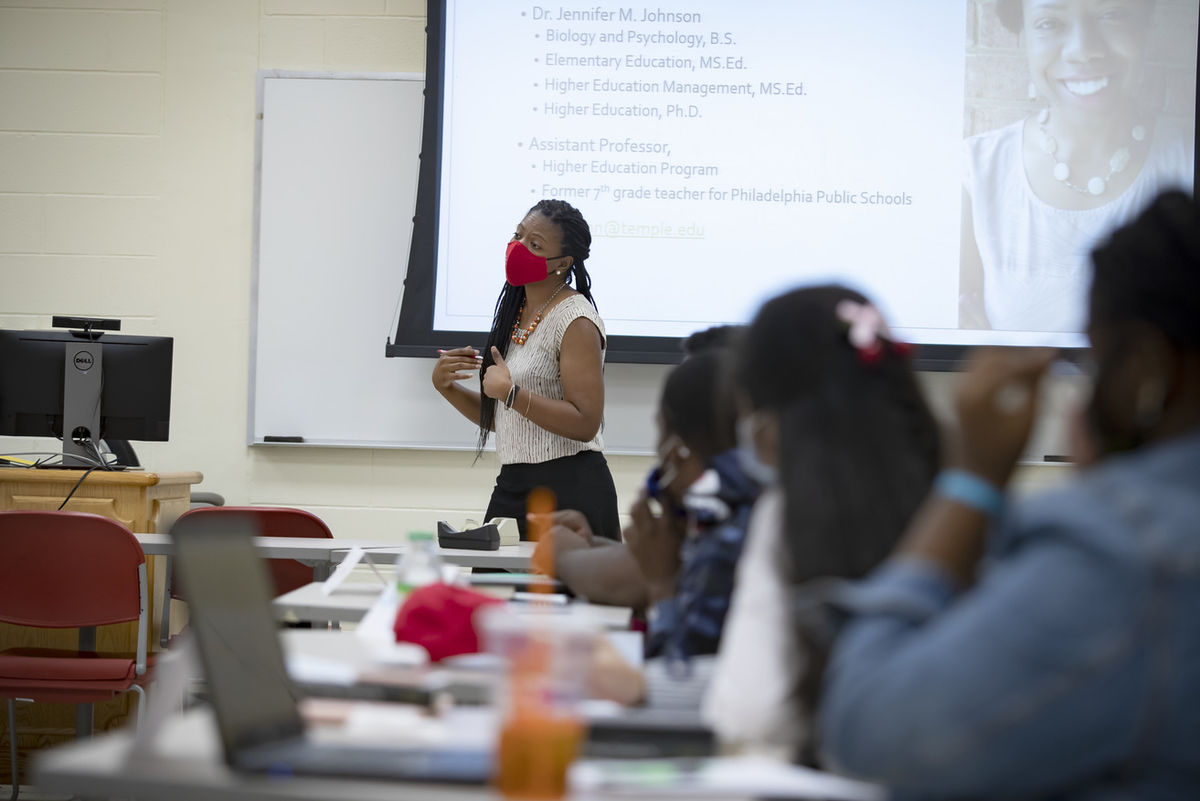
Johnson introduces herself in a classroom at Ritter Hall to the fourth cohort of high school students to take the Why Care About College course at Temple. (Photo by Betsy Manning)
Johnson noted the mission of the class is to help students understand the resources that are available at Temple as well as the value of interacting with peers and faculty members and joining clubs or organizations on campus. (Photo by Betsy Manning)
“Using those opportunities for interaction to become a more engaged student and someone who values lifelong learning is so important,” added Johnson. “Not just thinking of college as a means to an end, but really just a piece of a longer process, and an opportunity to reinforce the value of always growing and building a network of support on campus and off-campus.”
Over the past three years, Johnson has taught a total of 179 Temple undergraduates and 30 high school students in the Why Care about College course. Of the high school students, 29 immediately began college following high school graduation, and nine from that group chose to attend Temple.
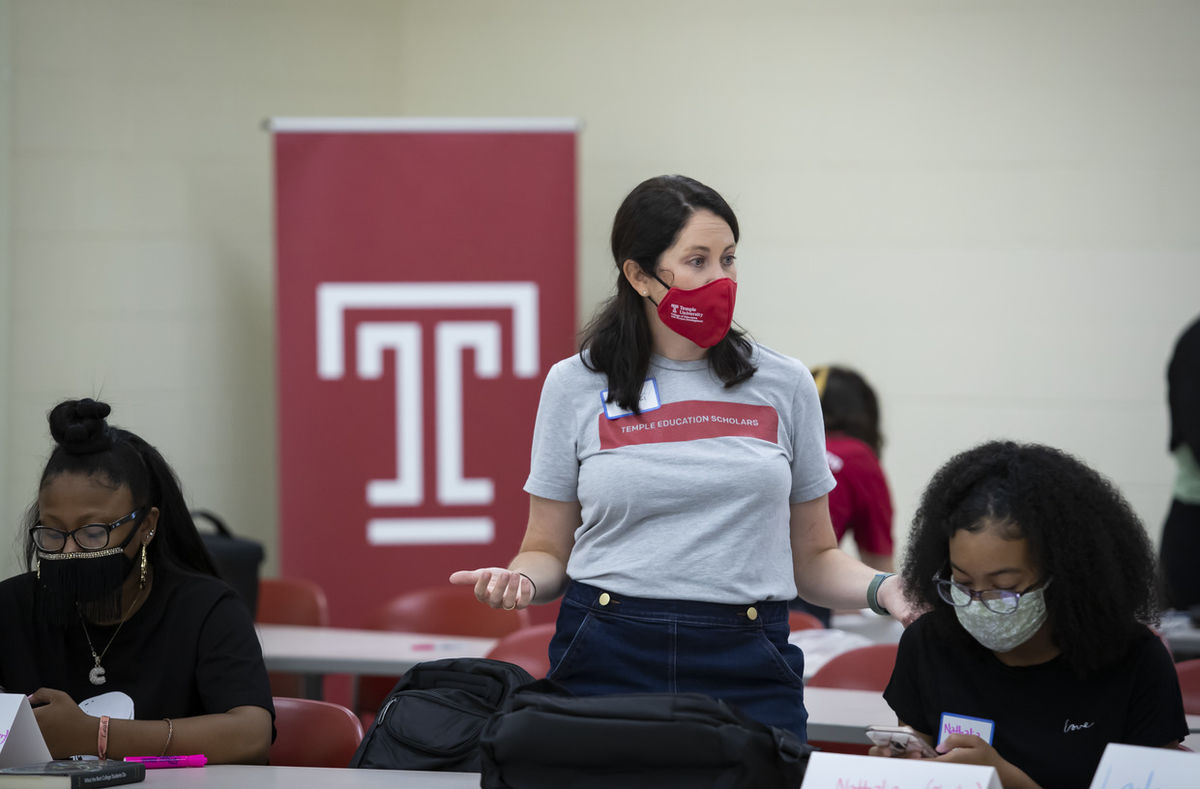
Curci greets the cohort of 17 high school students on the first day of class. (Photo by Betsy Manning)
Juliet Curci, assistant dean of college access and persistence in Temple’s College of Education and Human Development, said that the college includes this course as part of Temple Education Scholars and its dual enrollment offerings because it allows students to explore their potential futures, including post-secondary education. (Photo by Betsy Manning)
“The content in the class is great at really helping students think about the big picture of why they would want to pursue college, and it helps them reflect and think about what they want,” added Curci. “It gives them the opportunity and space to explore and take action around how they want to develop as a student.”
Curci noted that the funds to support the high school students’ participation in this course are drawn from Temple’s College of Education and Human Development and its contracts with the School District of Philadelphia and Mastery Charter Schools.
“The college is heavily invested in and aware of issues of access and success for students who identify as first-generation college students, and especially those from Philadelphia. We want to make sure that everyone has access to a high-quality education,” said Curci. “Having Philadelphia high school students prepare for their college and career pathways through dual enrollment is going to influence the opportunity for various fields to be able to have more diverse voices and representation within their organizations and companies.
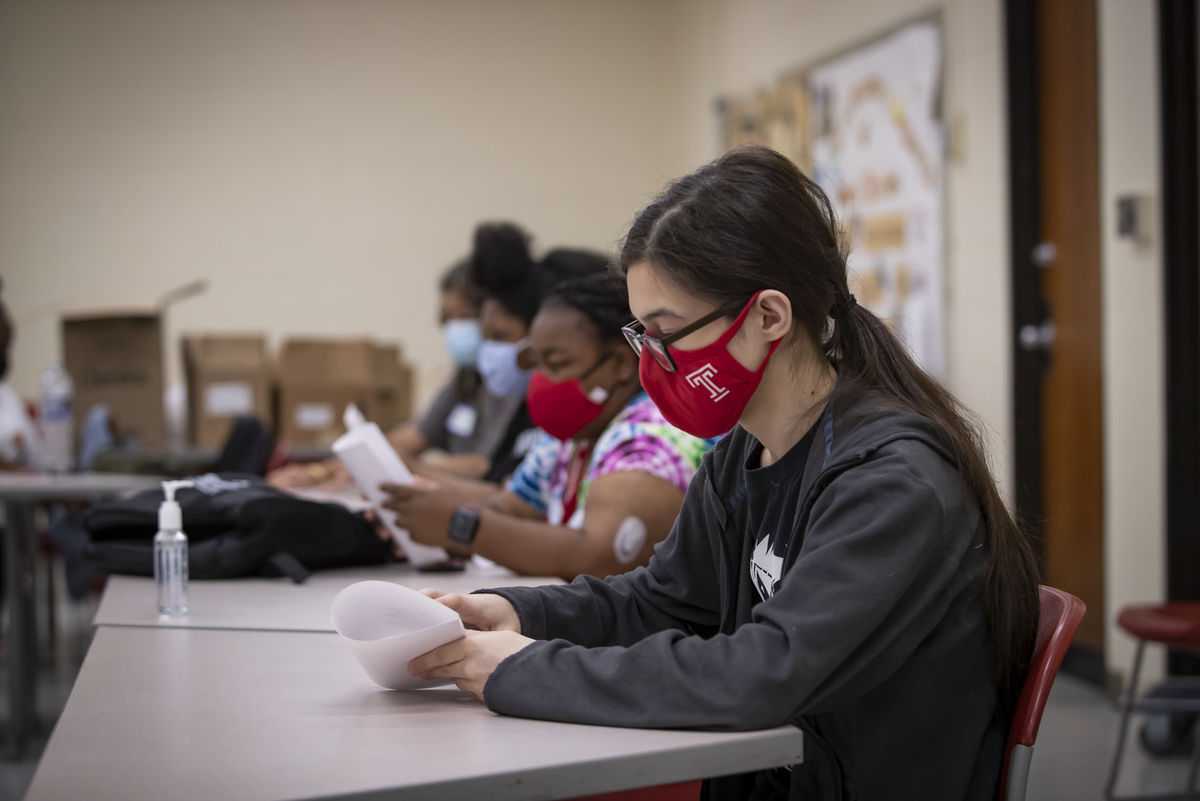
The 17 high school seniors in attendance on the first day of class will take up to five college education courses at Temple that are included in the Temple Education Scholars program. (Photo by Betsy Manning)
“A priority for us in Temple Education Scholars is the racial, academic, and high school diversity of the participants. In order to make dual enrollment attractive to high school students, it’s critical to offer coursework that is engaging, where they feel that they have a voice and that the material is relatable to them and their lives,” added Curci. “Why Care About College is a course that meets this criteria and serves as a great hook for fostering students’ interest in pursuing higher education after high school and equipping them with knowledge, tools, and resources to be successful.”
Khushi Sibal, a senior and Temple Honors student who majors in both psychology and cognitive neuroscience, said that she learned concepts from Johnson’s classes that she was able to apply to courses within her major.
“We learned about the growth mindset theory that enables you to learn things, despite them being difficult and how not to feel threatened by the level of difficulty,” said Sibal. “This theory taught us that we can really push ourselves to do better in our careers and future endeavors and that’s a very deep psychological term, so I was so glad to see that in the coursework.”
Sibal added that “Johnson really did a good job of encouraging all opinions from different vantage points and making sure that we felt like our voices were heard and that we were leading the discussions. This course gives students more confidence in college.”
Another participant in the class was Jelly Galapo, a sophomore and Temple Honors student who majors in information science and technology. She said she enjoyed the way Johnson connected with the students and that the course helped guide students toward their passions.
“Professor Johnson emphasized to us that the type of college that you go to is linked to your career path, that the people you meet along the way are going to impact it significantly,” said Galapo. “The class allowed me to voice my opinion, look toward the future, and consider the changes that must be implemented for the next generation. Learn more about the program impact of the Temple Education Scholars.
